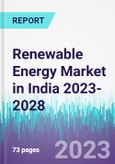The global demand for electricity is on a continuous rise, driven by improved living standards and accelerated urbanization. The need for renewable energy sources is surging as traditional electricity production, like thermal power plants, is gradually depleting. Solar and wind power are the primary choices for renewable energy sources in India.
Market Insights:
From FY 2019 to FY 2023, the cumulative installed renewable energy capacity (excluding large hydro) surged from 78.32 GW to 125.16 GW, demonstrating a compound annual growth rate (CAGR) of 12.43%. During this period, the proportion of renewable energy in the total installed power capacity climbed from 27.88% in FY 2022 to 30.08% in FY 2023. India has set ambitious targets, aiming to reduce carbon intensity by at least 45% by the end of the decade, achieve 50% of cumulative electric power from renewables by 2030, and attain net-zero carbon emissions by 2070. The country's goal is to achieve 450 GW of installed renewable energy capacity by 2030, with solar power contributing more than 60% of this capacity at 280 GW.Market Drivers:
Over the past five years, the costs of solar and wind power resources have experienced a significant decrease. This decline in solar prices in the country can be attributed to the synergy of affordable financing and anticipated reductions in solar and wind module costs. The Indian government has introduced multiple policies and strategies aimed at enhancing the energy storage infrastructure, encompassing a combination of standalone battery projects alongside renewable energy hybrid systems, as well as stipulations for ancillary services.Market Challenges:
Renewable energy initiatives exhibit a decentralized character, necessitating meticulous system planning and integration into the operation of transmission networks. These projects are frequently located in remote regions, distant from major cities, leading to limited transmission capacity. In urban areas, there is a relatively low level of social acceptance for renewable energy systems. Despite substantial government subsidies for solar water heaters and lighting systems, the adoption remains less than encouraging.Table of Contents
Chapter 1: Executive summaryChapter 2: Socio-economic indicators
Chapter 3: Introduction
Chapter 4: Market Overview
Chapter 5: Market Segmentation
Chapter 6: Government Initiatives
Chapter 7: Market trends
Chapter 8: Market Influencers
Chapter 9: Competitive landscape
Chapter 10: Recent developments
Chapter 11: Appendix
Companies Mentioned
- Adani Power Limited
- JSW Energy Limited
- NTPC Limited
- Orient Green Power Limited
- Suzlon Energy Limited
- The Tata Power Company Limited
- Torrent Power Limited
- Azure Power Global Limited
- GreenKo Group
- ReNew Energy Global Plc
Methodology

LOADING...








